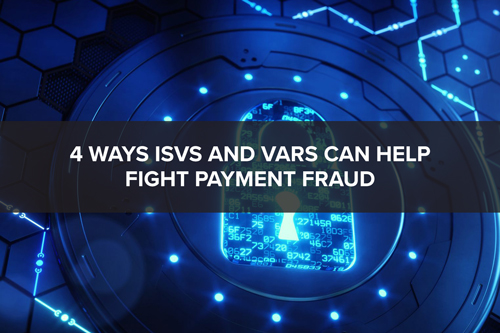 As the digital payments space expands, so do increasingly sophisticated ways of committing fraud. Credit card transactions and online payments offer a target-rich environment for the criminally minded. The Federal Trade Commission reports that losses in 2020 alone equaled $149 million.
As the digital payments space expands, so do increasingly sophisticated ways of committing fraud. Credit card transactions and online payments offer a target-rich environment for the criminally minded. The Federal Trade Commission reports that losses in 2020 alone equaled $149 million.
Merchants must be vigilant to protect their customers and their bottom lines and deploy solutions that are effective at curbing payment fraud. As a value-added reseller (VAR) or independent software vendor (ISV), you can ensure the solutions you provide include these technologies that mitigate the fraud risks to merchants.
Technology that Fights Payment Fraud
A variety of technologies are available to authenticate purchases, protect payment data, and minimize merchants’ losses.
EMV
Originating in Europe, EMV technology is now ubiquitous in the United States. Instead of legacy payment card transactions that involve swiping a magnetic stripe card, the EMV card is inserted into the terminal, triggering an authentication process. The chip communicates a unique transaction code with the terminal, making it nearly impossible for an actor to counterfeit cards. Additionally, EMV transactions eliminate the option for an actor to use a card skimmer, which could read and record numbers from a card with a magnetic stripe.
According to Visa, EMV is working. Since EMV was introduced in 2015 in the U.S., Visa reports there has been an 87 percent decrease in counterfeit fraud dollars.
Keep in mind that just because a merchant has EMV-capable hardware does not mean that the merchant is benefiting from the protection of EMV technology. Most EMV terminals also have magnetic strip readers, so merchants may think they have completed the upgrade because they have an EMV terminal but are still processing payments without using EMV technology. It’s worth asking, particularly if a prospect is a small or medium-sized business (SMBs), if they have EMV enabled.
Also, remember that EMV technology doesn’t protect card data after the transaction, so it’s vital to partner with a payments company that offers encryption and tokenization.
Encryption
Encryption technology like PCI-Validated Point to Point Encryption (P2PE) and Direct End to End Encryption (E2EE) are a sophisticated level of defense merchants can and should be using to stay one step ahead of payment fraud.
A PCI-Validated P2PE solution secures transactions by encrypting all data within a PCI-approved device, preventing human-readable cardholder data from being available. In addition to making data useless to a hacker, it also reduces PCI scope for the merchant, making compliance easier.
End-to-end encryption, like Datacap’s Direct E2EE, encrypts data at the point of interaction and then decrypts that data outside the point of sale environment. DirectE2EE utilizes a proprietary encryption format specific to each processing platform to encrypt payment data.
Tokenization
Tokenization substitutes customers’ payment account numbers with tokens, which are randomly generated alphanumeric codes. Instead of storing actual payment card data in their systems, merchants can use tokens to recognize customers and streamline transactions.
In the past, tokens were processor-specific. Therefore, if a merchant changed processors, it also meant updating tokens. Fortunately, you can partner with a payments company that supports cross-platform tokens that save time and enhance customer experiences.
Gift Card Fraud Protection
Gift card sales eclipsed $295 billion in 2020. All that money changing hands has attracted the attention of fraudsters looking to profit from this lucrative market. One growing trend in gift card fraud is to make a purchase with a stolen credit card and then return the purchase and demand a refund on a gift card. Gift cards can be an ideal target for fraudsters because they lack many of the protection systems used with payment cards.
But merchants do have tools they can use to combat gift card fraud. VARS and ISVs can protect clients by providing them with gift card systems that use fraud mitigation measures such as fraud detection, maximum value limits, and online PINs.
Fraud Doesn’t Have to Be the Cost of Doing Business
Fraud can be a massive problem for a business: eating up profits and diminishing the business’s bottom line. It can even endanger the ability to accept credit card payments if it tips the scales and has the merchant classified as high-risk.
However, merchants often don’t have time to keep up with the latest methods being used by fraudsters or the techniques and technology effective at stopping them. Merchants need a valued business advisor to show them how to mitigate this risk.
Don’t wait to react when your customers learn about fraud the hard way. Provide payment fraud prevention technologies now so they never experience how much of an impact fraud can make on their businesses.



